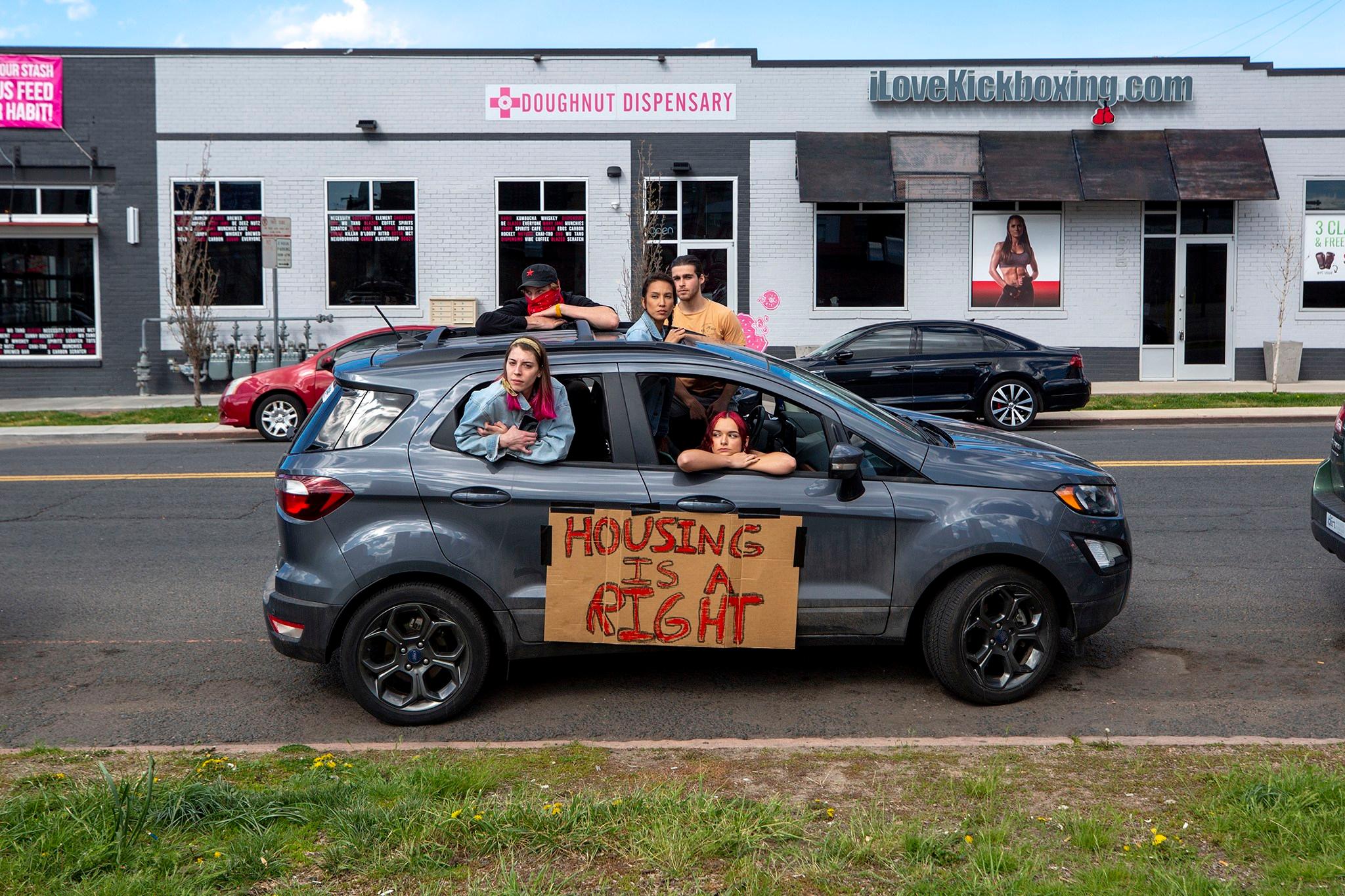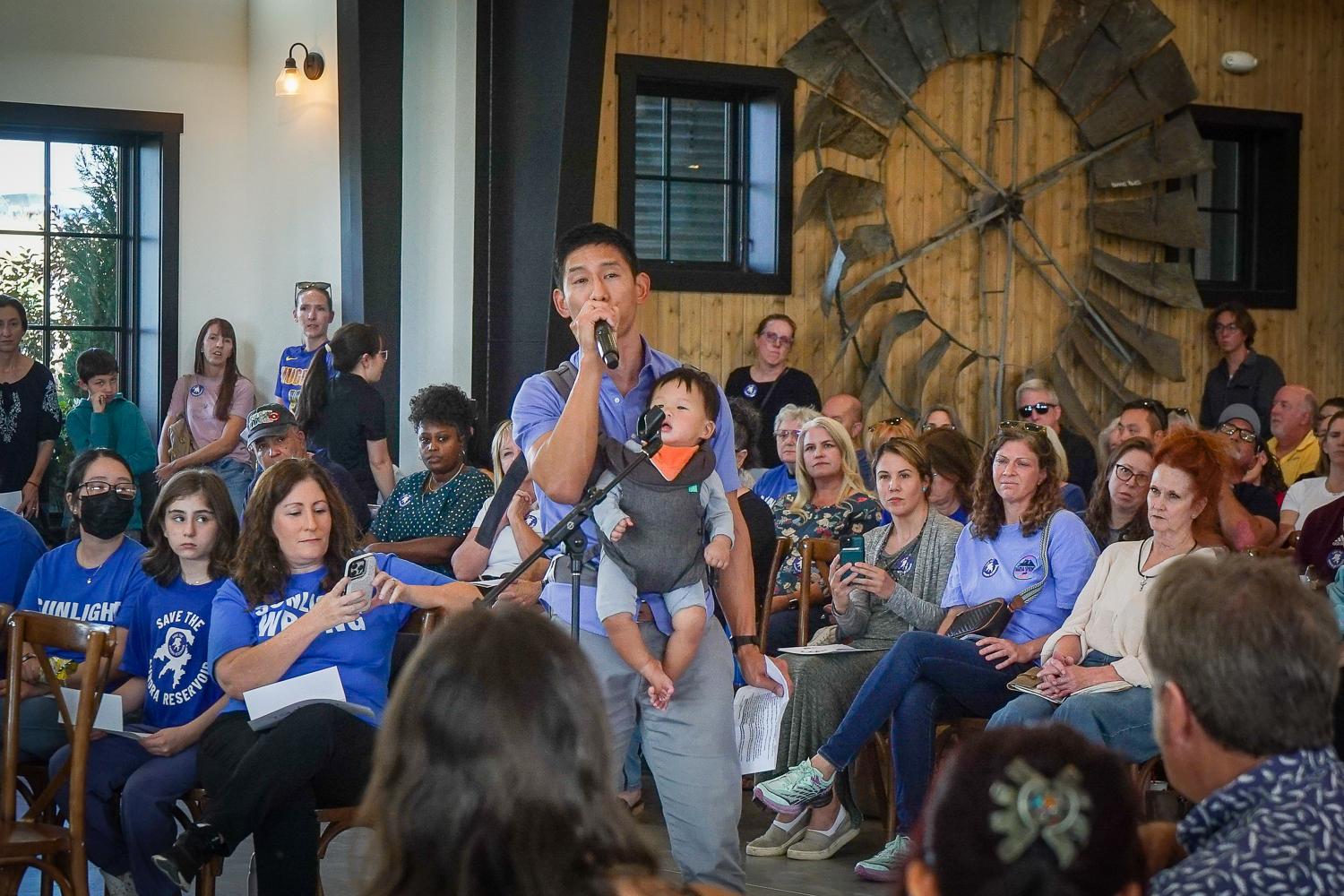
Carrie Ragsdale, 42, came home last Friday to find an eviction notice stuck in the doorway of her apartment in Rifle. It demanded that she leave the building or pay April’s rent within 10 days.
She was out of work and didn’t have the money. She only had choices — for herself and her 2-year-old daughter. Would she call and beg for mercy? Would she move to Denver to pick up an old job? Or wait and see if the eviction really happened?
“I haven’t started packing my things yet,” she said, her voice breaking, “because then it’s finalized.”
Theoretically, Ragsdale could stay for a couple months without being evicted. The local courts aren’t processing evictions paperwork, and the sheriff’s office didn’t enforce any removals in April. That situation will continue statewide for at least another month, by order of Gov. Jared Polis.
“There will be no evictions for lack of payment for May, just as there have not been for April,” Polis said at a press conference Wednesday.
Early in the crisis, Polis encouraged government officials to “find ways” to minimize evictions. That appeared to work: Courtroom eviction proceedings were all but frozen in April.
On Thursday the governor went further, issuing an explicit statewide ban on evictions and late fees during the COVID-19 emergency. Advocates praised the move, saying it would remove lingering confusion and unify the patchwork of rules that resulted from Polis’ earlier, more voluntary, approach.
“It’s such a relief to not have to worry about this issue for the time being, for the rest of May. … Even just the specter of a potential eviction filing was keeping people up at night and causing considerable distress,” said Jack Regenbogen, senior attorney for the Colorado Center on Law & Policy.
Still, housing advocates say a dark cloud is looming. Many renters are unsure of their rights, making them vulnerable to aggressive landlords. And the state hasn’t frozen rent, so those missed rent bills continue to stack up by the month.
Meanwhile, some landlords are continuing to post 10-day payment demands, like the one Ragsdale got; those can speed up future evictions if tenants don’t pay. They are also banned under the new order, according to a spokesperson for Polis.
“What happens come June?” Ragsdale asked herself after the notice arrived.
She was caught without a paycheck, having quit her gas-station job in frustration just before the outbreak hit — a “rash” decision that she feared would now set off a life-destroying chain reaction.
“That’s what I’m afraid of,” she said. “Should I just cut my losses and get out now?”
Evictions on hold, but rent still due
The threat is simple: Failing to pay rent now will be grounds for eviction proceedings as soon as Polis’ order expires. Currently, that’s set for the end of May.
“Once the sheriffs are allowed to serve them, it’s going to be business as usual. You’re going to have a very limited time to respond and very limited recourse to avoid consequences," said Annie Martinez, an attorney and the president of the Colorado Hispanic Bar Association.
One group, the COVID-19 Eviction Defense Project has estimated that some 350,000 Coloradans will be vulnerable to eviction later this year. The estimate is based on survey data about income and rent in Colorado. It assumes that the unemployment rate remains historically high and new federal unemployment benefits aren’t extended past July.
The crisis moves into a new phase as rent comes due next week; it’s the second monthly deadline since massive coronavirus-related layoffs began in March.
While stay-at-home restrictions are gradually lifting, the economy could be years in recovery. Social distancing requirements will limit how many customers businesses can serve, and whole sectors of the economy, like tourism and entertainment, will remain shuttered indefinitely.
“If you're not working now, are you going to be able to pay your rent the next month, or the next month?” said Ean Tafoya, co-chair of the Colorado Latino Forum.
Polis has taken a few steps to ease the financial pressure on tenants, including a $3 million fund for low-income rental and mortgage assistance. That money has been distributed to various nonprofits and other groups, but fears are running high for some renters.
Darixela, a 31-year-old undocumented immigrant from Honduras, is still waiting to see what her Lakewood landlord does. CPR is not using her last name because of her legal status.
“The biggest worry is paying rent,” she said through a translator. “It seems [the U.S.] is a very different place. Rent doesn’t wait for you. You have to pay every month or you’re out on the streets.”
Her husband’s housepainting work has dried up, and unemployment benefits aren’t available to people who entered the country illegally. The family pays $1,000 rent for the one-bedroom apartment where they live with their five young children. They’d managed a partial payment in April, but paying for May is unfathomable.
“Truthfully, we don’t know what to do,” she said.
With evictions on hold, tenants’ attorneys warn that renters could face illegal retaliation or coercion from their landlords. Some attorneys have seen their clients' power cut off, which is not allowed. State Rep. Jonathan Singer of Boulder said he has heard from people who've been asked for sex by their landlords.
Tenants' rights advocates push for more
While progressive groups have celebrated the temporary freeze on evictions, they still consider it a half measure. What they’re pushing for is simple, and drastic: Cancel rent obligations during the crisis, giving tenants a fresh start.
The Denver City Council recently asked Polis to “use the full legal extent of his emergency powers to impose an immediate moratorium on residential and small business commercial rent payments for those unable to pay.”
Some Democratic politicians in Congress have demanded the same, including U.S. representatives Alexandria Ocasio-Cortez of New York and Ilhan Omar of Minnesota.
Polis has rejected the idea, arguing he doesn’t have the power to “suspend the sanctity of contract law.” He’s not alone in that position; no state has suspended rent or mortgage obligations. Property owners have warned of mass disruptions if they can’t pay their own bills.
That leaves beleaguered Colorado renters with one choice: Try to strike a deal, or face an eviction threat later.
Many landlords are willing to work with tenants. Some are hosting raffles to encourage people to pay on time. Others are opening negotiations and discounts.
Alex Yoder, a manager of privately owned rentals in El Paso and Teller County, simply asked tenants what they could pay at the moment.
Yoder expects tenants to eventually repay their missed rent, but he said he won’t press for details until the financial situation becomes more clear. Eviction is a costly and time-consuming process for landlords, and advocates on both sides say that most will try to find a compromise.
“Tenants and landlords are not on opposite sides of the table. It's a very symbiotic relationship,” he said. “We very much need each other to survive.”
Anyone negotiating with a landlord should get a written agreement in plain, simple language, attorneys say, especially if the tenant has been served a 10-day rent demand.
Just digging deeper?
But, in the long run, some renters fear even a repayment plan will simply put them deeper in the hole.
Zack Hattani, 23, was laid off from the Native Roots cannabis dispensary just a day after paying a deposit on a new apartment. A month later, his unemployment hasn’t arrived, and he can’t afford May’s rent.
The rental company has offered him a deal: Spread it out over six months. But Hattani worries that he won’t be able to afford the higher rent in the months to come, especially when unemployment benefits shrink back to normal in July.
“I have no options. I have a terrible credit score and didn’t have savings,” he said. “It’s kind of hard to talk about this.”
Rachael May was offered a six-month repayment plan for a corporate-owned apartment in Federal Heights. Her husband’s work in hazmat cleanup has dropped by about 25 percent. He doesn’t want to take COVID-19-related cleanup jobs, since their infant recently suffered a respiratory illness.
“I am willing to work out a situation with them. I just don’t feel like paying the full amount is fair,” she said of her landlord.
Some renters are organizing to ask for better terms. The Facebook group “Colorado Rent Strike and Eviction Defense” has attracted more than 4,000 members, offering renters some solidarity and advice for organizing their communities.
“I’m done being the silent neighbor,” said May, who attended a recent vehicle-based protest. … “I’m fearful for my kids. I’m fearful for losing the home above their heads. That’s, of course, always a thought, but I also have to show them that they have a strong mom and we have to fight for what is right.”
The Colorado Apartment Association says that tenants have largely paid their rent so far. About 9 percent of renters hadn’t paid as of April 10, compared to about 7 percent in earlier months, according to CAA data. But the association acknowledged that number could grow in May.
What happens next?
When the courts do reopen, some tenants could face immediate demands to leave.
“I’m still incredibly concerned that without further policy intervention we’re going to be witnessing displacement on a catastrophic level,” said attorney Regenbogen.
Sheriff Matt Lewis of Mesa County said it should be a “slow” resumption, but it will depend on how judges throughout the state spin up proceedings.
“The judicial system will hopefully base them on public safety concerns,” Lewis said. “We take no pleasure in having to do this, we take no pride in having to move people from these homes, but it is a statutory obligation of the office of sheriff.”
Advocates want to see government leaders do more to slow the wave.
Regenbogen suggested that the legislature could extend the “cure” period for evictions. Some states allow renters to repay their debt and avoid eviction at any point before they’re removed, as opposed to within 10 days of the demand.
Annie Martinez, the attorney, urged the governor to extend eviction protections further into the future.
“With a long enough pause,” she said, “you’re going to incentivize landlords to work with people.”
In the meantime, many of Colorado’s renters are counting down the days to their next deadline.









